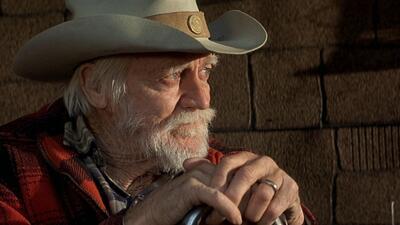The moment added another few years to my waiting game, reluctant to deal with those emotions that I couldn’t shake, the images seared into the back of my eyelids. In ensuing weeks, I’d listen from bed as the music by Nine Inch Nails and the sound of atomic bombs thrummed from the television as he watched “The Water & The Well.” This was a series, a director, so clearly revered, so notably important, yet here I was missing out.
My relationship to the work of David Lynch fundamentally changed with “The Straight Story.” Some might call me a “sensitive type.” Not so much heart-on-her-sleeve and more that the dead raccoon on the side of the road makes me instantly weepy. I harbor the unfortunate character trait of carrying emotions with me long past the initial moment they’re expressed.
There’s something to be said about waiting until you’re ready for specific pieces of film and television—ready for the discomfort, the discussions, the overall analysis. “The Straight Story” isn’t the first Lynch film I watched, but it’s the one I most frequently return to. Discovering films and filmmakers at your own pace offers revelatory, emotional experiences that come from watching a terrific, life-changing film when you’re ready to receive it.
I long knew that the work of David Lynch would eviscerate me. From the depiction of callous human nature to the corner-of-your-eye scares, his fiction intimidates. Little did I know that the greatest weapon in his arsenal to affect me was his abundance of compassion. For a long time, I assumed “Mulholland Drive,” the first film of his I watched, would remain my favorite. With its bombastic, highly stylized sequences, its emotional catharsis, and lush, noir aesthetic, it was riveting in a manner that speaks to my tastes. Then I saw “Blue Velvet” and while taking in the youthful, traumatized eyes of Kyle MacLachlan as vagrants taunted him, threatening violence, I realized that those emotional stakes were present in most of Lynch’s work. Both films contained the depravity of human nature—the ugly, insidious underbelly of the world—but they found humanity buried in the gutters.
“Dune” earned the hallowed badge of being one of those films experienced by watching live across servers with friends during the lockdown. “Eraserhead” needled yet wowed; “The Elephant Man,” obviously impressed; “Lost Highway” wasn’t for me. Then, “The Straight Story” provided eternal hope for our capacity to heal.

One of the best discoveries about Lynch is his persistent testing of audiences’ patience and the different methods that spring forth from it, from who killed Laura Palmer to the indescribable sonic panic attack of “Eraserhead.” “The Straight Story” does it simply by stripping it down. Methodical, linear, and in constant, glacial motion.

